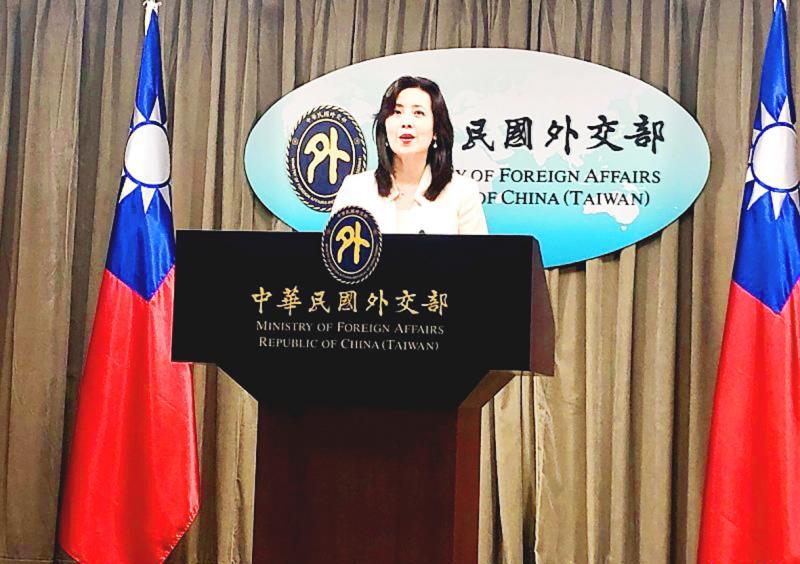A senior BBC correspondent who had left China after facing legal threats and pressure from authorities over his reporting, has arrived in Taiwan and is in COVID-19 quarantine, Ministry of Foreign Affairs (MOFA) spokeswoman Joanne Ou (歐江安) said yesterday.
John Sudworth on Wednesday told BBC Radio 4 that he had relocated to Taiwan after nine years in Beijing, where he reported on Xinjiang rights abuses and the COVID-19 pandemic, as it was “too risky to carry on.”
Threats from Chinese authorities had “intensified” in the past few months, he added.

Photo: Lu Yi-hsuan, Taipei Times
At least 18 foreign correspondents were expelled by China last year, during a tit-for-tat row with the US that harmed the international press presence in the country.
Press freedom groups say that the space for foreign reporters to operate in China is increasingly tightly controlled, with journalists followed on the streets, experiencing harassment online and refused visas.
Ou said that she believes Sudworth will “feel that Taiwan is a free and democratic nation.”
From January last year to last month, 39 correspondents and 21 outlets moved to Taiwan, including the New York Times, the Washington Post, the Wall Street Journal and the BBC, she said.
Taiwan is a free and democratic nation with a diverse and open society, and news organizations are welcome to send correspondents to work without restrictions, she said.
“The BBC has faced a full-on propaganda attack not just aimed at the organization itself, but at me personally across multiple [Chinese] Communist Party-controlled platforms,” said Sudworth, who is to continue to work as a China correspondent from Taiwan.
“We face threats of legal action, as well as massive surveillance now, obstruction and intimidation, whenever and wherever we try to film,” he said, adding that he and his family had been “followed by plainclothes police” as they left to fly out of China.
Sudworth’s wife, Irish journalist Yvonne Murray, left the country with him “because of mounting pressure from the Chinese authorities,” her employer, Radio Television of Ireland (RTE), reported.
“We left in a hurry as the pressure and threats from the Chinese government, which have been going on for some time, became too much,” she told RTE.
In the past few weeks, Chinese state media and officials have repeatedly attacked Sudworth for his reporting on alleged forced labor practices targeting Uighurs in Xinjiang’s cotton industry in particular.
On Wednesday, the Chinese embassy in Ireland said that Sudworth “has been strongly criticized by a lot of Chinese for his unfair, unobjective and biased reporting on China.”
On Twitter the embassy said: “Nobody has forced or will force” Sudworth’s wife to leave China.
The BBC confirmed Sudworth’s relocation after China’s state-run Global Times reported that he was “hiding” in Taiwan.
In the middle of last month, Xinjiang authorities said that Sudworth was the target of a civil lawsuit for producing “fake news” about the region.
Additional reporting by CNA

Taiwanese actress Barbie Hsu (徐熙媛) has died of pneumonia at the age of 48 while on a trip to Japan, where she contracted influenza during the Lunar New Year holiday, her sister confirmed today through an agent. "Our whole family came to Japan for a trip, and my dearest and most kindhearted sister Barbie Hsu died of influenza-induced pneumonia and unfortunately left us," Hsu's sister and talk show hostess Dee Hsu (徐熙娣) said. "I was grateful to be her sister in this life and that we got to care for and spend time with each other. I will always be grateful to

REMINDER: Of the 6.78 million doses of flu vaccine Taiwan purchased for this flu season, about 200,000 are still available, an official said, following Big S’ death As news broke of the death of Taiwanese actress and singer Barbie Hsu (徐熙媛), also known as Big S (大S), from severe flu complications, the Centers for Disease Control (CDC) and doctors yesterday urged people at high risk to get vaccinated and be alert to signs of severe illness. Hsu’s family yesterday confirmed that the actress died on a family holiday in Japan due to pneumonia during the Lunar New Year holiday. CDC Deputy Director-General Tseng Shu-hui (曾淑慧) told an impromptu news conference that hospital visits for flu-like illnesses from Jan. 19 to Jan. 25 reached 162,352 — the highest

COMBINING FORCES: The 66th Marine Brigade would support the 202nd Military Police Command in its defense of Taipei against ‘decapitation strikes,’ a source said The Marine Corps has deployed more than 100 soldiers and officers of the 66th Marine Brigade to Taipei International Airport (Songshan airport) as part of an effort to bolster defenses around the capital, a source with knowledge of the matter said yesterday. Two weeks ago, a military source said that the Ministry of National Defense ordered the Marine Corps to increase soldier deployments in the Taipei area. The 66th Marine Brigade has been tasked with protecting key areas in Taipei, with the 202nd Military Police Command also continuing to defend the capital. That came after a 2017 decision by the ministry to station

PETITIONS: A Democratic Progressive Party official quoted President William Lai as saying that civil society groups are organizing the recall drives at the grassroots level Some civil society groups yesterday announced that they have collected enough signatures to pass the first-stage threshold to initiate a recall vote against Chinese Nationalist Party (KMT) legislators in 18 constituencies nationwide, saying that they would submit the signatures to the Central Election Commission (CEC) today. They also said that they expected to pass the threshold in eight more constituencies in the coming days, meaning the number of KMT legislators facing a recall vote could reach 26. The groups set up stations to collect signatures at local marketplaces and busy commercial districts. The legislators their petition drives target include Fu